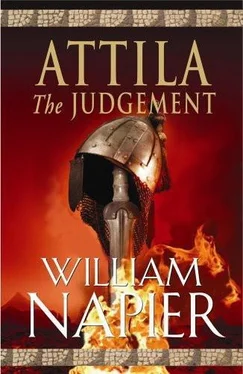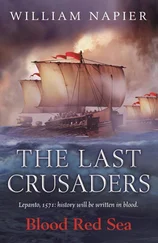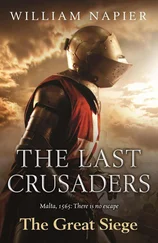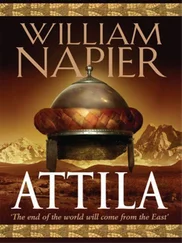William Napier - The Judgement
Здесь есть возможность читать онлайн «William Napier - The Judgement» весь текст электронной книги совершенно бесплатно (целиком полную версию без сокращений). В некоторых случаях можно слушать аудио, скачать через торрент в формате fb2 и присутствует краткое содержание. Жанр: Исторические приключения, на английском языке. Описание произведения, (предисловие) а так же отзывы посетителей доступны на портале библиотеки ЛибКат.
- Название:The Judgement
- Автор:
- Жанр:
- Год:неизвестен
- ISBN:нет данных
- Рейтинг книги:5 / 5. Голосов: 1
-
Избранное:Добавить в избранное
- Отзывы:
-
Ваша оценка:
- 100
- 1
- 2
- 3
- 4
- 5
The Judgement: краткое содержание, описание и аннотация
Предлагаем к чтению аннотацию, описание, краткое содержание или предисловие (зависит от того, что написал сам автор книги «The Judgement»). Если вы не нашли необходимую информацию о книге — напишите в комментариях, мы постараемся отыскать её.
The Judgement — читать онлайн бесплатно полную книгу (весь текст) целиком
Ниже представлен текст книги, разбитый по страницам. Система сохранения места последней прочитанной страницы, позволяет с удобством читать онлайн бесплатно книгу «The Judgement», без необходимости каждый раз заново искать на чём Вы остановились. Поставьте закладку, и сможете в любой момент перейти на страницу, на которой закончили чтение.
Интервал:
Закладка:
Little Bird winced as if the touch was as cold as Scythian frost. ‘You might as well ask a mouse to bear a boulder on his back, my master.’
Attila’s arms fell by his sides again, and he sat back again.
‘In my hoar old age I thought I had had reverence, piety, glory, empery, and now it is gone from me, everything is taken from me, my empire stutters and fails like a pauper’s tallow candle. A seer once said my beloved son Ellak would inherit my empire. I know now what empire he spoke of: the great, the infinite empire of nothing.’
‘Do not say so, master.’
‘My sons quarrel with one another and soon enough they will war with each other, once their father is gone and nothing remains of him but fading footprints and bones. My Checa is gone the way of all flesh, motes of dust in the sun, the ribs of long-dead cattle bleached white, no birdsong, no sweet waters, an empty desert place, a tattered village beside a dying lake.
‘I am as broken as the earth riven by ice. There is none to help me bear it; a king must die alone. My heart sings with grief, a lonely, mountain-top grief which only a dying king can know. The Madness of King Goll. I heard the Celtic slaveboy singing, long ago, who knew the ancient prophecies of the Sibyl. The grey wolf knows me
… The hare runs by me, growing bold… “They will not hush, the leaves a-flutter round me, the beech leaves old.” King Goll, old friend, I know you, and I see your face in the water. Is it I who has brought them to this pass and this predestinate end?’ He stirred and trembled, his eyes wild, his hands gripping the finials of the alien throne. ‘Oh, I shall go mad! Oh, let me not be mad!’
‘O Father,’ said Little Bird, laying his head in his lord’s lap, ‘my heart will keep company with yours as both break.’
12
At last word came that Attila was marching on Rome.
Aetius rode down the Flaminian Way from Ravenna to cut him off, with a force of little more than one thousand men. A ludicrous number. He had hoped that the citizens of Ravenna, Fiorentia, Rome itself, might have joined him in this last, wretched battle in Roman history, little more than a skirmish. But the people had already fled.
As Aetius and his column neared the half-abandoned city on the seven hills, however, they met an extraordinary sight: a cortege headed by the Bishop of Rome, Leo, proceeding north, unarmed, to meet Attila. Priests in their chasubles carried crosses, banners, censers, and chanted hymns; the gold of the monstrances and dalmatics gleamed in the Italian sunlight; Bishop Leo himself, stocky and round-faced and cheerful like the Campanian countryman he was, riding a plump white horse slightly too small for him, was flanked by long lines of choirboys and deacons.
‘What the hell is this?’
The bishop reined in. ‘Master-General Aetius? Join us. Ride with us. And allow us to talk with Attila first, before-’
‘Talk with Attila! Your Holiness, with all due respect, talking with him, pleading with him, paying him off – at this late stage – is like a hind pleading with a lion, when the lion has already got its teeth in her arse!’
The bishop smiled indulgently. Such vigorous similes reminded him of his country boyhood. ‘ Talk with Attila,’ he resumed composedly, ‘before you and your brave soldiers line up to face him for battle.’
Aetius stared. Then he gave the order to fall in behind.
It was near the Mincius river that Attila and the Bishop of Rome had their talk. The gentle farmland of Virgil and Catullus, now trampled by barbarian cavalry.
In Leo’s small party of priests and chaplains was also a burly old fellow with a white beard, and a younger man with brown eyes. Some said they were all the way from Britain, but others doubted that as a tall tale. Many tall tales grew up about that meeting. That Attila and the Britons and the papal party exchanged ancient Sibylline verses, and that after he had heard them in full the dread King of the Huns, the Scourge of God, hung his head, and began to pull his men back and turn them round. Some even claimed that Rome was saved by Attila’s superstitious dread of the Christian Church, and a few old, garbled rhymes. Others commented that Attila’s force was spent anyway; he had been defeated on the Catalaunian Fields.
The meeting did confirm one thing. The legions of Rome truly belonged to the past. Attila did not fear armies, but he feared the god of the Christians: the god who had thundered at him from the dark depths of Rhemi cathedral. The old military power of Rome was extinguished, but the new power of the Catholic Church had replaced it.
‘It was not the priest of the Christians who made me depart,’ said Attila, ‘but that other, in the white robe, standing behind him.’
Orestes frowned. ‘There was none such.’
‘He bore a flaming sword.’
Orestes fell silent and then stepped out of the king’s tent. He heard a sing-song voice away in the darkness.
‘The Great Spirit wills it.
Dry your eyes.
The white man comes.
A People dies.’
13
In the west of Britain, an old man and his son at last came home to their simple long-house. The old man eased himself off his horse and a woman only a few years younger came out and wept and embraced him. They clung to each other, then went inside. The younger man went to stable the horses.
The woman said, ‘The Christians prevailed?’
Lucius nodded. ‘This time.’ She helped him off with his heavy British cloak. ‘What news?’
She shook her head.
‘From the fortress of war?’
‘It has been silent. A messenger rode out, travelling by water. But…’
‘He has not returned?’
Seirian shook her head again, pleading, ‘But the fortress of war cannot have fallen?’
Lucius turned to see Cadoc stepping over the threshold, unbuckling his sword-belt. He reached out a hand to his son.
‘Keep it on.’
Cadoc looked up, his hand still on his buckle, eyes bright and prophetic.
Attila’s sons were already squabbling over his inheritance while the aged King sat upon his wooden throne in his tent upon the Hungvar, bow clutched in hand, staring ahead, his face as grey as old lead, his thoughts devouring him.
‘For of this generation of men they shall not say we were the mightiest. The great Eagle of the Skies turns his head away, his golden eyes no longer mark us, his gaze is upon far other kings and empires now. We are little creatures to him, we are chirruping crickets in the grass, we are tedious to him, and all our vaunts and wars are ridiculous to him. He has left us here, our All-Father has abandoned us, and we are but orphans of the steppe, orphans of the world. The gold and the precious stones and all the treasury of his divine blessing is passed on to another people, and we are utterly forgotten.
‘I read it all in the book of the Jews and the Christians. He has cut us off in the day of his fierce anger. He has led us into darkness and not into light. Surely he has turned against us. He has made our chains heavy, and our ways desolate. The joy in our hearts has ceased, for he has set his bow against us and made us a mark for the arrow. Our dance is turned into mourning, and the crown of the world is fallen from our heads.
‘The ghosts of my people came to me, skeletal, barely fleshed, clawing at me, ancient hags with wrinkled dugs, saying I killed my father; and now my Father kills me. The Lord Astur is against me, the wind of the world is turned upon me, my sons fight before my eyes, the battle is lost and the dream is done. We are all orphans in the end, O my soul.
‘How all things fall and perish! And how all things come about again. Our crimes and iniquities, which we fancied we left on the road behind us, long ago, as we went forth to our glory, in truth ran ahead of us in the night while we were sleeping, and wait for us on the road ahead to greet us, their smiles grim and their hands outstretched.’
Читать дальшеИнтервал:
Закладка:
Похожие книги на «The Judgement»
Представляем Вашему вниманию похожие книги на «The Judgement» списком для выбора. Мы отобрали схожую по названию и смыслу литературу в надежде предоставить читателям больше вариантов отыскать новые, интересные, ещё непрочитанные произведения.
Обсуждение, отзывы о книге «The Judgement» и просто собственные мнения читателей. Оставьте ваши комментарии, напишите, что Вы думаете о произведении, его смысле или главных героях. Укажите что конкретно понравилось, а что нет, и почему Вы так считаете.












